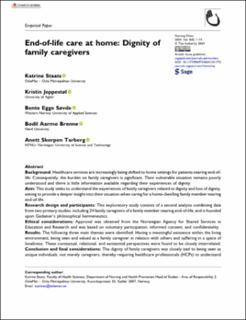| dc.description.abstract | Background:
Healthcare services are increasingly being shifted to home settings for patients nearing end-of-life. Consequently, the burden on family caregivers is significant. Their vulnerable situation remains poorly understood and there is little information available regarding their experiences of dignity.
Aim:
This study seeks to understand the experiences of family caregivers related to dignity and loss of dignity, aiming to provide a deeper insight into their situation when caring for a home-dwelling family member nearing end-of-life.
Research design and participants
This exploratory study consists of a second analysis combining data from two primary studies, including 24 family caregivers of a family member nearing end-of-life, and is founded upon Gadamer’s philosophical hermeneutics.
Ethical considerations:
Approval was obtained from the Norwegian Agency for Shared Services in Education and Research and was based on voluntary participation, informed consent, and confidentiality.
Results:
The following three main themes were identified: Having a meaningful existence within the living environment, being seen and valued as a family caregiver in relation with others and suffering in a space of loneliness. These contextual, relational, and existential perspectives were found to be closely interrelated.
Conclusion and final considerations:
The dignity of family caregivers was closely tied to being seen as unique individuals, not merely caregivers, thereby requiring healthcare professionals (HCPs) to understand their personal needs. This study highlights the emotional distress and loneliness family caregivers feel in their dual role within the healthcare system, thereby calling for HCPs to adopt an attitude of gentleness and recognition to impart dignity-preserving care in homecare practices. | en_US |

